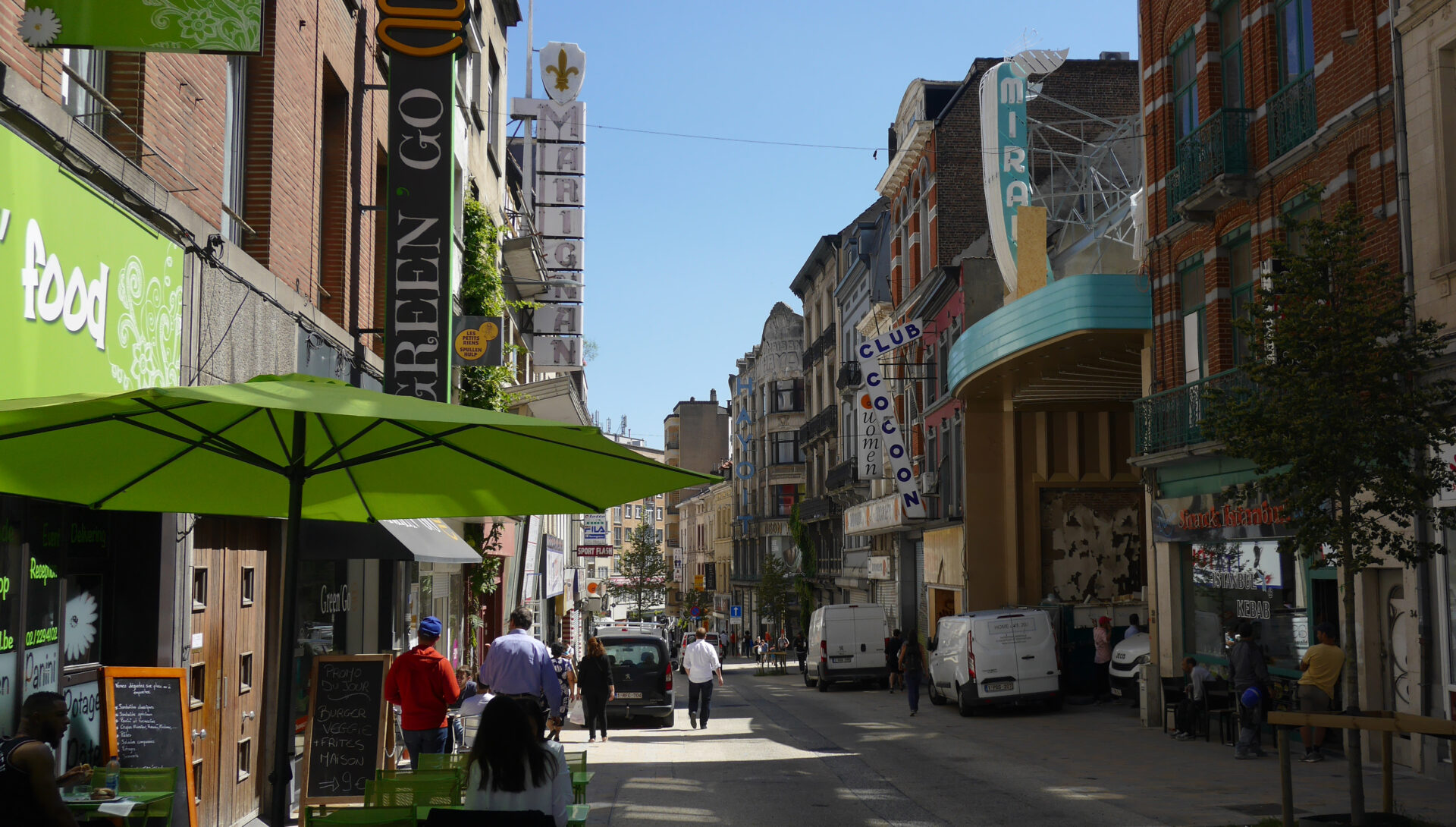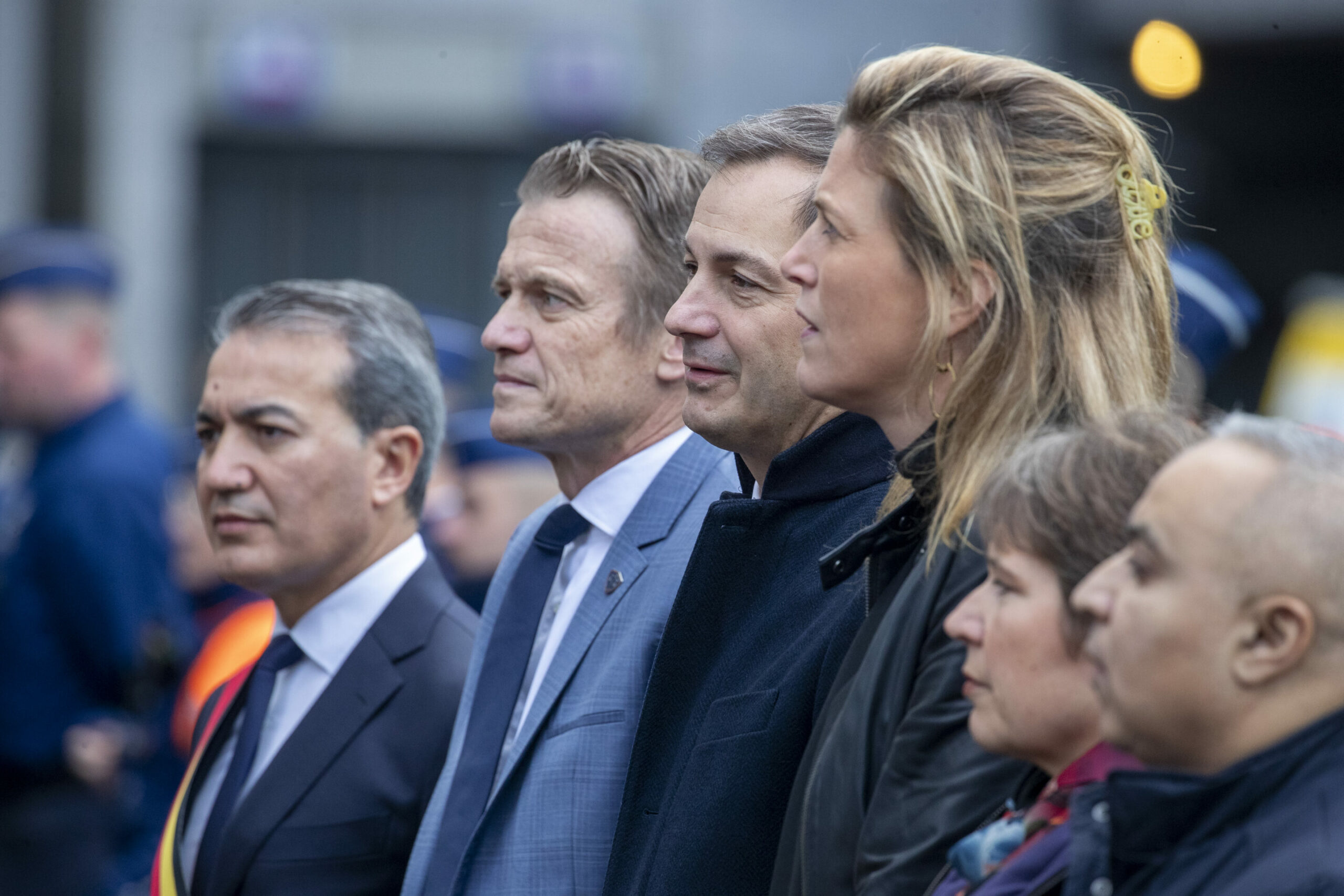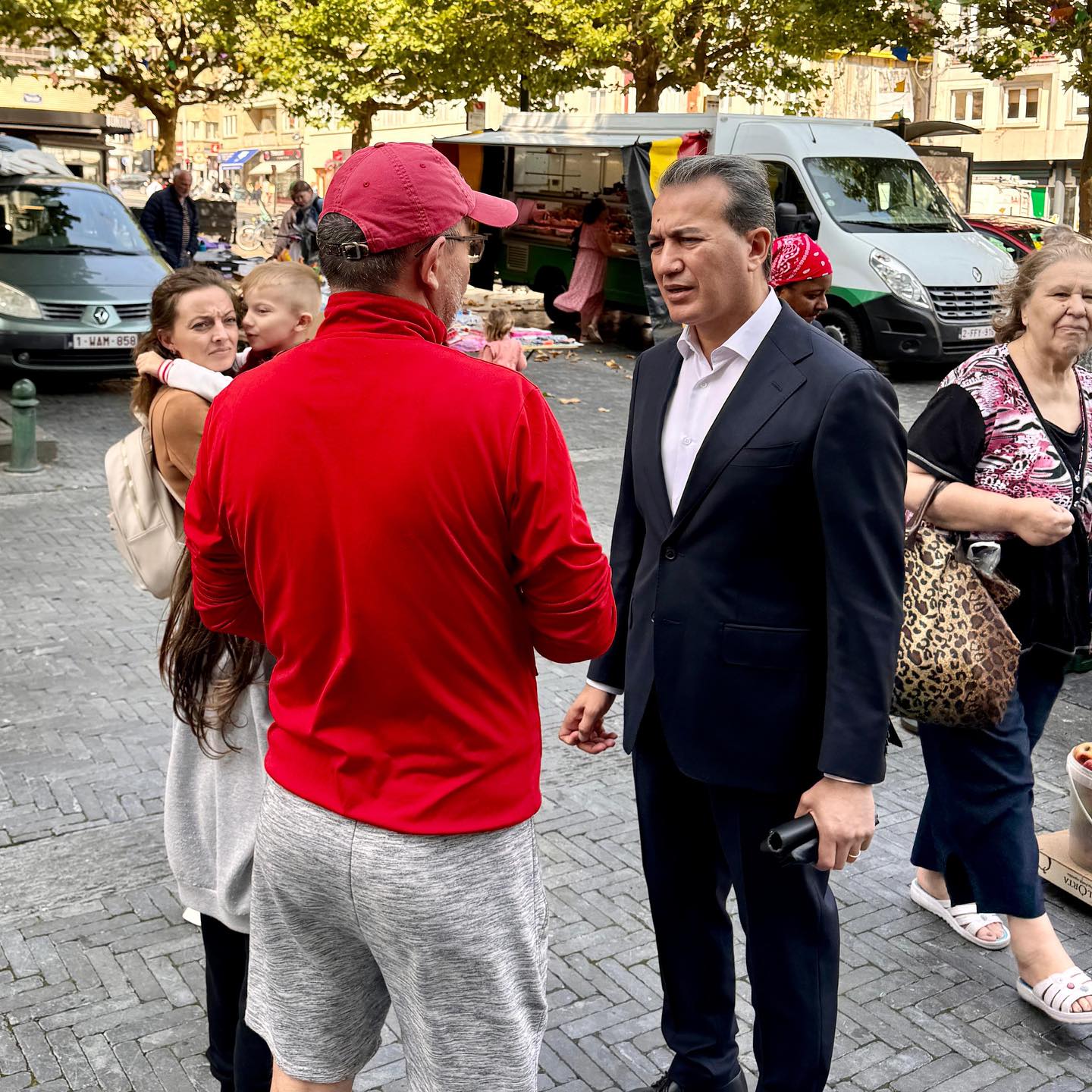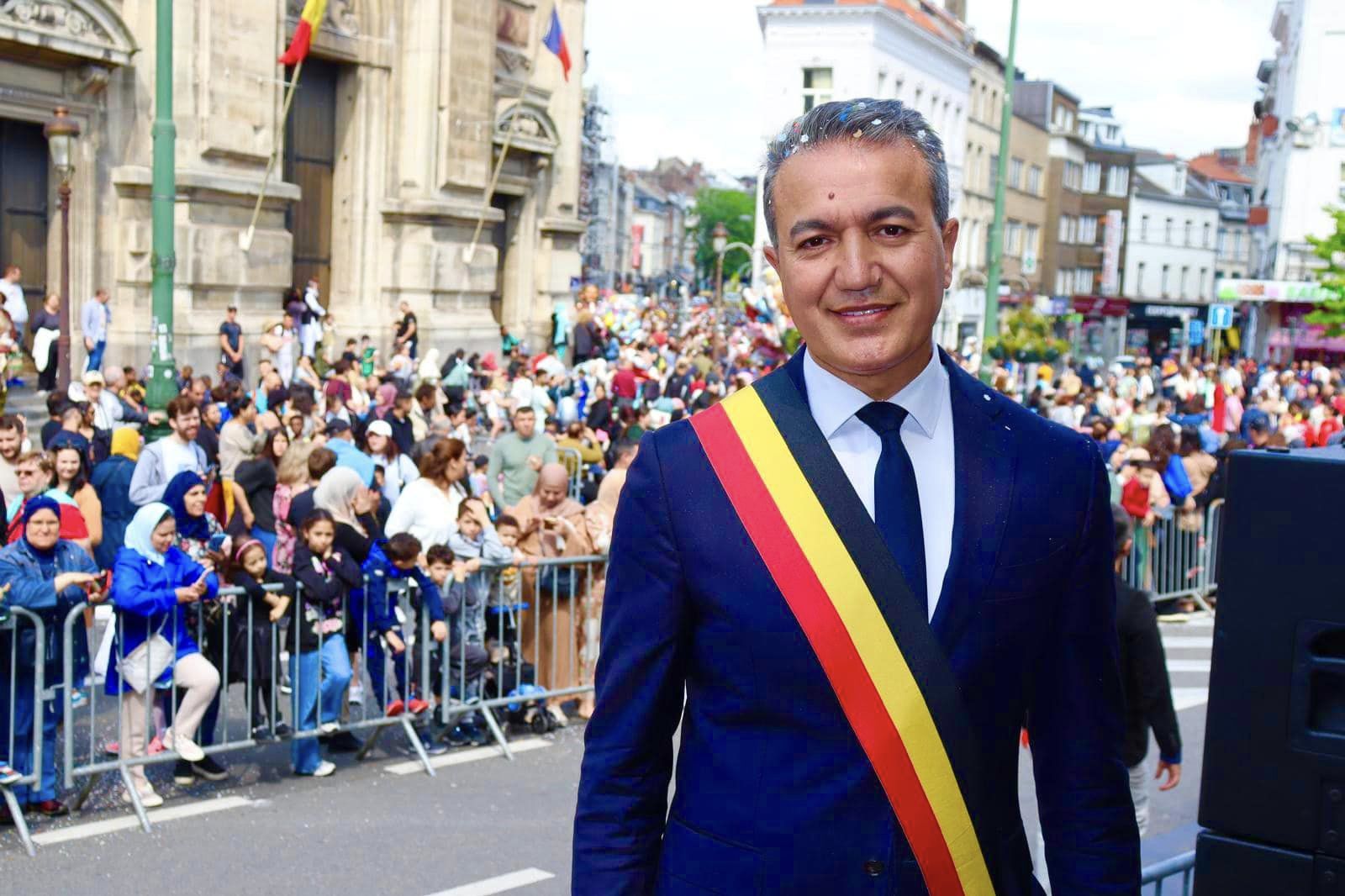Despite its prime Brussels location, squeezed between EU institutions, the tourist centre and the business district, tiny Saint-Josse-ten-Noode is the poorest commune in Belgium. Emir Kir, Saint-Josse’s mayor for the past 12 years, attributes this disparity to the commune’s historical role as a working-class neighbourhood.
“These places used to be neighbourhoods for workers and low-income people,” he says. “Places like Uccle are more bourgeois neighbourhoods. In France, low-income families live outside the city. Here, they live inside.”
But the 55-year-old says he has an inclusive approach to governance. “As mayor, I say: ‘We do not choose people, our doors are open to everyone. We do not do politics for some people to leave here and others to come.’”
Born in Charleroi, Kir held ministerial positions in the Brussels regional government and the French Community Commission before being elected Saint-Josse mayor in 2012 with the francophone Socialist Party (PS). He was also a member of the Belgian federal parliament for a decade until June.
One of Belgium’s first mayors with a Turkish background – his father was a guest worker in the 1960s and worked as a miner – he is fluent in French, Flemish, English and Turkish. He cites three major achievements over the past 12 years: continuity during Covid, addressing the cost-of-living crisis, and improving the urban environment.
“While many municipalities were closed during the Covid period, we never closed. We believe continuity is a must. Those who did not have digital opportunities were able to continue to receive their documents. We showed everyone that they could rely on us,” Kir says.

Chaussee de Louvain in Saint-Josse-ten-Noode, Brussels. Credit: Belga
Saint-Josse offered grants and subsidies to boost purchasing power, such as making documents free of charge (except for ID, passport, and driver’s license). “All activities in schools have become free. Our sports academy is free. We also give sports cheques: we started with €100, today we are giving €260 for children between the ages of four and 18,” he says.
Saint-Josse twice sent similar cheques of €75 to citizens for spending at local shops, which helped businesses in crisis. “We also made payments of up to €8,000 to these local shops during Covid,” he says. “We removed taxes on restaurant terraces so they could have more space for their customers. If a street was being renovated, we gave €2,000 every month to tradesmen so that they could stay afloat. And we provided €1,500 of support to shops who renewed their facades.”
Kir is also proud of his environmental record, noting that streets are cleaned daily and that 70 have been adorned with flowers. “As a municipality, we produced our own street furniture – while many others leave this to the private sector. We make our own barriers, seats, stakes, poles. Thanks to these projects, we opened up job opportunities for young people,” he adds.
Good Move, wrong move?
When it comes to Good Move, the Brussels region policy aimed at tackling road congestion, he lambasts it as “a complete failure” for locals. “It was PS and Ecolo government that banned petrol and diesel cars as of 2025,” he says. “What a shame. The value of these cars will evaporate and people will get poorer. They will not get any money in return.”
Kir complains that the policy prioritises bicycles and scooters over car owners and pedestrians. “Our priority is fluidity,” he says. “It should be possible to go from one place to another - but unfortunately, we lost that with this project. Good Move became ‘stop move’.”
He says transport policy should be “balanced”, supporting pedestrian paths and strengthening public transportation. “Bicycles and scooters should not be allowed everywhere,” he says. “Of course, bicycles are important, but one should not be more than the other. The balance should be maintained. The main traffic should pass through the big streets.”
Good Move’s emphasis on public transport, walking and cycling should favour Saint-Josse’s less-well-off residents, with statistics suggesting that 70% of them don’t own a car, but Kir dismisses these numbers as a “blatant lie.”
He says Saint-Josse loses out when it comes to parking. “They say that we have few citizens who use cars. But there are 25,000 civil servants working in our area. They make a mockery of us. People here sometimes drive around for an hour to find a parking space.”

Saint-Josse-ten-Noode Mayor Emir Kir, Minister of Justice Paul Van Tigchelt, Prime Minister Alexander De Croo and Interior Minister Annelies Verlinden pictured during a remembrance ceremony. Credit: Belga / Nicolas Maeterlinck
Kir recognises the rise in drug trafficking and gun violence but blames Antwerp. “They failed to take the necessary precautions despite all these gun attacks,” he says. The city with the highest cocaine use is Antwerp, and Brussels is in sixth place. We want vehicles to be checked at the Belgian border. Antwerp needs to be inspected more tightly.”
Some 8,000 people live on the streets, Kir says, many struggling with alcoholism or drug addiction, and municipalities are left alone to deal with these issues. He highlights Saint-Josse’s recent hiring of police officers and its improved lighting in problematic areas, including road tunnels as measures to combat it.
Freedom of speech?
Kir’s tenure has not been without incident. He was in the news in April when he attempted to block a gathering of far-right figures, the National Conservativism Conference. He denies trying to stifle free speech. “I am more for freedom of expression than anyone else, but I am also responsible for security here,” he says.
He says the decision to block the meeting was based on a Foreign Ministry report that warned there was a high chance of violent clashes by counter-protesters. “What would they say if incidents broke out in that area, shops were looted and people were injured? They would have blamed me for not taking action despite having this information,” he argues, adding that if it happened again today, he would make the same decision.
He adds that the conference only ended up in Saint-Josse because it had been refused permission by the Etterbeek and Brussels communes, for the same security reasons. “Why was there no reaction to the decisions taken by the other two mayors, but there was a reaction to my decision?” he says. Kir was even attacked by Prime Minister Alexander De Croo for his stance, but he stood his ground. “I told him: I am not the prime minister. I am the mayor. I fulfilled my responsibility,” he says.

Saint-Josse Mayor Emir Kir speaking to local residents
Kir was expelled from the PS in 2020 for meeting with mayors from Turkey’s ultra-nationalist MHP party in Brussels. He is still frustrated about this and says he was a victim of double standards in Belgian politics. He notes that the President of the EU Committee of the Regions, Karl-Heinz Lambertz, also a Belgian socialist, had officially invited Turkish mayors, including those from MHP.
“When Lambertz, a socialist, invites them, there is no discussion, but they expel me from the party. This only shows how hypocritical the PS is,” he says.
Still, Kir is proud of his dual Belgian and Turkish heritage, even if it is hard. “When a Belgian does certain things, they seem normal. When you do them as a Turk, they are perceived differently,” he says. “We Turks are useful as long as we can stay in office.”

